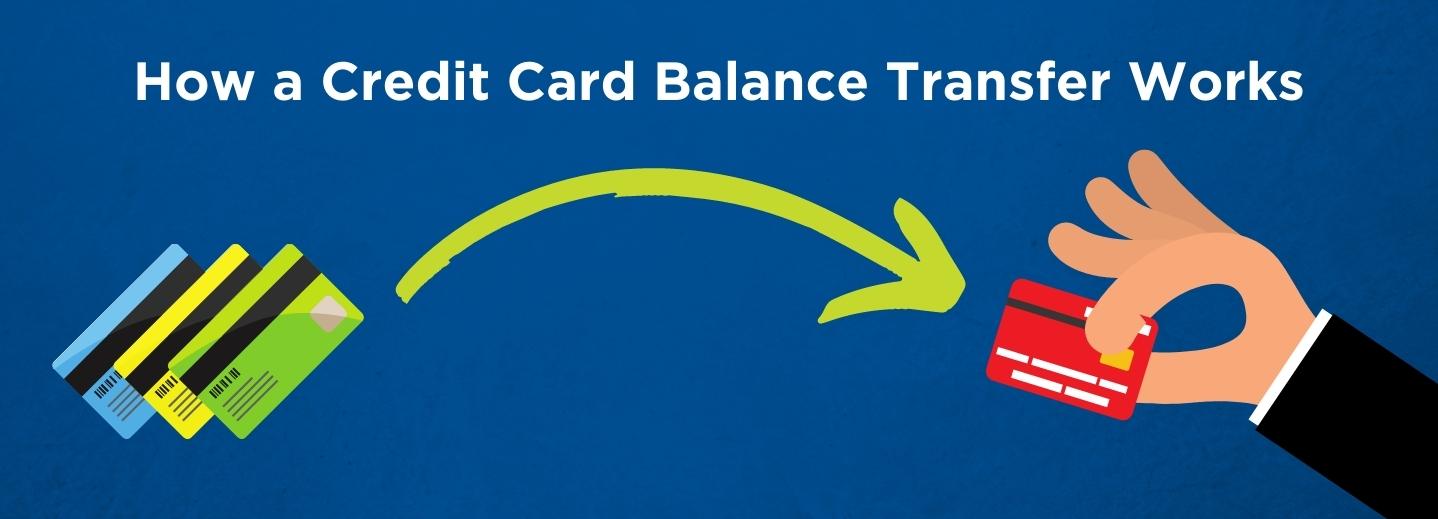How a Credit Card Balance Transfer Works

Credit card debt is the most common type of consumer debt in the United States. If you aren’t paying off the balance every month, overwhelming debt can really sneak up on you. This can especially be the case when you have high-interest credit cards. Fortunately, there’s a strategy you can use to get your credit card debt back under control and save money at the same time called a balance transfer.
What is a Balance Transfer?
A balance transfer is a term used to describe moving the balances from one or more credit cards to a new credit card (usually with a much lower interest rate). The transfers themselves are easy to complete. It often only requires filling out an application or calling your financial institution(s) directly to initiate the transfer.
How Do Balance Transfers Work?
Balance transfers are usually done to save money on interest or help you better manage your credit card debt. To understand how a balance transfer works, here is an example.
Assume you have three credit cards with balances totaling $10,000. Each credit card has a different interest rate.
| Credit Card 1 | $5,000 at 15% APR |
| Credit Card 2 | $2,000 at 18% APR |
| Credit Card 3 | $3,000 at 22% APR |
With a balance transfer, you can move the balances from each of your three credit cards to a new card with a lower interest rate.
(APR = Annual Percentage Rate)
| New Credit Card | $10,000 at 3.9% APR |
Now you only have one monthly payment instead of three.
Plus, your interest rate is much lower, allowing you to significantly save more on interest each month.
What are the Financial Benefits of a Balance Transfer?
There are several reasons people consider transferring balances from one credit card to another. Here are a few of the top reasons:
- Manage Debt. If you have several credit cards, it can become challenging to keep up with the payment dates and various balances. By consolidating your balances into one credit card, it’s easier to manage your debt.
- Pay Less Interest. Transferring the balances of several high-interest credit cards to a single, lower-rate card can significantly lower the amount of interest you pay each month.
- Promotional Offers. Financial institutions will frequently offer incentives, such as 0% APR for six months. People will often transfer balances to these credit cards to use the interest-free period to help them get their credit card debt back under control.
While there are many perks to balance transfers, there are also precautions.
What Should You Consider Before Transferring a Balance?
Balance transfers offer a convenient means to managing credit card debt and paying less in interest. However, this tactic should be used responsibly and in conjunction with a larger strategy to eliminate your credit card debt.
A few things to consider before transferring credit card balances:
- Transfer Costs. The special offer you receive for that 0% APR balance transfer may actually include expensive balance transfer fees. Read the fine print and make sure the transfer doesn’t cost you more than you will save on interest. It’s quite common to find offers with $0 balance transfer fees if you do your research.
- Frequent Transfers. If you are transferring balances frequently, lenders may question your ability to repay your debts. They could see you as only juggling debt between cards, versus trying to repay your balances. Take advantage of that low-rate and focus on paying down your debt before transferring the balance again.
- Caps on Incentives. Many people participate in credit card churning. This practice is when you frequently open new credit cards to take advantage of bonus reward points. Many lenders are putting caps on incentives people can receive as a result. Opening new lines of credit frequently can lower your credit score and hinder your ability to qualify for the best low-rate card.
CAMPUS Can Help!
At CAMPUS, we offer no-fee balance transfers on all credit cards. Check out our credit card comparison chart to determine which card is best for you. If you are looking to manage your debt and need a little more structure in the repayment terms, a debt consolidation loan may be the best solution for you.
Please stop by any of our convenient service center locations or call 800-367-6440 to discover which strategy will work best for your unique financial situation. As your credit union, our goal is to help you make the right decisions to ensure your financial success.
More resources:
How Debt Consolidation Loans Work and the Benefits
Use our free Credit Card Debt Payoff Calculator
By CAMPUS USA